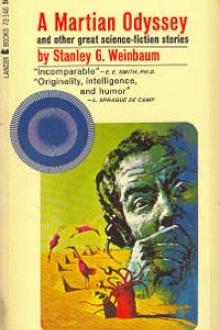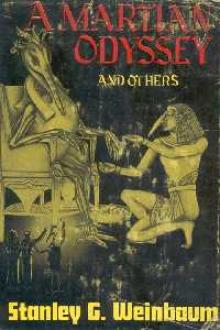The Circle of Zero, Stanley Grauman Weinbaum [books to read this summer TXT] 📗

- Author: Stanley Grauman Weinbaum
- Performer: -
Book online «The Circle of Zero, Stanley Grauman Weinbaum [books to read this summer TXT] 📗». Author Stanley Grauman Weinbaum
The Circle of Zero
by Stanley G. Weinbaum
1936
Try for EternityIf there were a mountain a thousand miles high and every thousand years a bird flew over it, just brushing the peak with the tip of its wing, in the course of inconceivable eons the mountain would be worn away. Yet all those ages would not be one second to the length of eternity.
I don’t know what philosophical mind penned the foregoing, but the words keep recurring to me since last I saw old Aurore de Neant, erstwhile professor of psychology at Tulane. When, back in ‘24, I took that course in Morbid Psychology from him, I think the only reason for taking it at all was that I needed an eleven o’clock on Tuesdays and Thursdays to round out a lazy program.
I was gay Jack Anders, twenty-two years old, and the reason seemed sufficient. At least, I’m sure that dark and lovely Yvonne de Neant had nothing to do with it. She was but a slim child of sixteen.
Old de Neant liked me, Lord knows why, for I was a poor enough student. Perhaps it was because I never, to his knowledge, punned on his name. Aurore de Neant translates to Dawn of Nothingness, you see; you can imagine what students did to such a name. ‘Rising Zero’—‘Empty Morning’—those were two of the milder soubriquets.
That was in ‘24. Five years later I was a bond salesman in New York and Professor Aurore de Neant was fired. I learned about it when he called me up. I had drifted quite out of touch with University days.
He was a thrifty sort. He had saved a comfortable sum, and had moved to New York and that’s when I started seeing Yvonne again, now darkly beautiful as a Tanagra figurine. I was doing pretty well and was piling up a surplus against the day when Yvonne and I …
At least that was the situation in August, 1929. In October of the same year I was as clean as a gnawed bone and old de Neant had but little more meat. I was young and could afford to laugh—he was old and he turned bitter. Indeed, Yvonne and I did little enough laughing when we thought of our own future—but we didn’t brood like the professor.
I remember the evening he broached the subject of the Circle of Zero. It was a rainy, blustering fall night and his beard waggled in the dim lamplight like a wisp of grey mist. Yvonne and I had been staying in evenings of late. Shows cost money and I felt that she appreciated my talking to her father, and—after all—he retired early.
She was sitting on the davenport at his side when he suddenly stabbed a gnarled finger at me and snapped, ‘Happiness depends on money!’
I was startled. ‘Well, it helps,’ I agreed.
His pale blue eyes glittered. ‘We must recover ours!’ he rasped.
‘How?’
‘I know how. Yes, I know how,’ he grinned thinly. ‘They think I’m mad. You think I’m mad. Even Yvonne thinks so.’
The girl said softly, reproachfully, ‘Father!’
‘But I’m not,’ he continued. ‘You and Yvonne and all the fools holding chairs at universities—yes! But not I.’
‘I will be all right, if conditions don’t get better soon,’ I murmured. I was used to the old man’s outbursts.
‘They will be better for us,’ he said, calming. ‘Money! We will do anything for money, won’t we, Anders?’
‘Anything honest.’
‘Yes, anything honest. Time is honest, isn’t it? An honest cheat, because it takes everything human and turns it into dust.’ He peered at my puzzled face. I will explain,’ he said, ‘how we can cheat time.’
‘Cheat—’
‘Yes. Listen, Jack. Have you ever stood in a strange place and felt a sense of having been there before? Have you ever taken a trip and sensed that sometime, somehow, you had done exactly the same thing—when you know you hadn’t?’
‘Of course. Everyone has. A memory of the present, Bergson calls it.’
‘Bergson is a fool! Philosophy without science. Listen to me.’ He leaned forward. ‘Did you ever hear of the Law of Chance?’
I laughed. ‘My business is stocks and bonds. I ought to know of it.’
‘Ah,’ he said, ‘but not enough of it. Suppose I have a barrel with a million trillion white grains of sand in it and one black grain. You stand and draw single grains, one after the other, look at each one and throw it back into the barrel. What are the odds against drawing the black grain?’
‘A million trillion to one, on each draw.’
‘And if you draw half of the million trillion grains?’
‘Then the odds are even.’
‘So!’ he said. ‘In other words, if you draw long enough, even though you return each grain to the barrel and draw again, some day you will draw the black one—_if you try long enough!_’
‘Yes,’ I said.
He half smiled.
‘Suppose now you tried for eternity?’
‘Eh?
‘Don’t you see, Jack? In eternity the Law of Chance functions perfectly. In eternity, sooner or later, every possible combination of things and events must happen. Must happen, if it’s a possible combination. I say, therefore, that in eternity, whatever can happen, will happen!’ His blue eyes blazed in pale fire.
I was a trifle dazed. ‘I guess you’re right,’ I muttered.
‘Right! Of course I’m right. Mathematics is infallible. Now do you see the conclusion?’
‘Why—that sooner or later everything will happen.’
‘Bah! It is true that there is eternity in the future; we cannot imagine time ending. But Flammarion, before he died, pointed out that there is also an eternity in the past. Since in eternity everything possible must happen, it follows that everything must already have happened!’
I gasped. ‘Wait a minute! I don’t see—’
‘Stupidity!’ he hissed. ‘It is but to say with Einstein that not only space is curved, but time. To say that, after untold eons of millennia, the same things repeat themselves because they must! The Law of Chance says they must, given time enough. The past and the future are the same thing, because everything that will happen must already have happened. Can’t you follow so simple a chain of logic?’
‘Why—yes. But where does it lead?’
To our money! To our money!’
‘What?’
‘Listen. Do not interrupt. In the past all possible combinations of atoms and circumstances must have occurred.’ He paused then stabbed that bony finger of his at me. ‘Jack Anders, you are a possible combination of atoms and circumstances! Possible because you exist at this moment!’
‘You mean—that I have happened before?’
‘How apt you are! Yes, you have happened before and will again.’
‘Transmigration!’ I gulped. ‘That’s unscientific.’
‘Indeed?’ He frowned as if in effort to gather his thoughts. ‘The poet Robert Burns was buried under an apple tree. When, years after his death, he was to be removed to rest among the great men of Westminster Abbey, do you know what they found? Do you know?’
‘I’m sorry, but I don’t.’
‘They found a root! A root with a bulge for a head, branch roots for arms and legs and little rootlets for fingers and toes. The apple tree had eaten Bobby Burns—but who had eaten the apples?’
‘Who—what?’
‘Exactly. Who and what? The substance that had been Burns was in the bodies of Scotch countrymen and children, in the bodies of caterpillars who had eaten the leaves and become butterflies and been eaten by birds, in the wood of the tree. Where is Bobby Burns? Transmigration, I tell you! Isn’t that transmigration?’
‘Yes—but not what you meant about me. His body may be living, but in a thousand different forms.’
‘Ah! And when some day, eons and eternities in the future, the Laws of Chance form another nebula that will cool to another sun and another earth, is there not the same chance that those scattered atoms may reassemble another Bobby Burns?’
‘But what a chance! Trillions and trillions to one!’
‘But eternity, Jack! In eternity that one chance out of all those trillions must happen—must happen!’
I was floored. I stared at Yvonne’s pale and lovely features, then at the glistening old eyes of Aurore de Neant.
‘You win,’ I said with a long sigh. ‘But what of it? This is still nineteen twenty-nine, and our money’s still sunk in a very sick securities market.’
‘Money!’ he groaned. ‘Don’t you see? That memory we started from—that sense of having done a thing before—that’s a memory out of the infinitely remote future. If only—if only one could remember clearly! But I have a way.’ His voice rose suddenly to a shrill scream. ‘Yes, I have a way!’
Wild eyes glared at me. I said, ‘A way to remember our former incarnations?’ One had to humour the old professor. ‘To remember—the future?’
‘Yes! Reincarnation!’ His voice crackled wildly. Re-in-carnatione, which is Latin for “by the thing in the carnation”, but it wasn’t a carnation—it was an apple tree. The carnation is dianthus carophyllus, which proved that the Hottentots plant carnations on the graves of their ancestors, whence the expression “nipped in the bud”. If carnations grow on apple trees—’
‘Father!’ cut in Yvonne sharply. ‘You’re tired!’ Her voice softened. ‘Come. You’re going to bed.’
‘Yes,’ he cackled. ‘To a bed of carnations.’
Memory of Things PastSome evenings later Aurore de Neant reverted to the same topic. He was clear enough as to where he had left off.
‘So in this millennially dead past,’ he began suddenly, ‘there was a year nineteen twenty-nine and two fools named Anders and de Neant, who invested their money in what are sarcastically called securities. There was a clown’s panic, and their money vanished.’ He leered fantastically at me.
‘Wouldn’t it be nice if they could remember what happened in, say, the months from December, nineteen twenty-nine, to June, nineteen thirty—next year?’ His voice was suddenly whining. ‘They could get their money back then!’
I humoured him. ‘If they could remember.’
They can!’ he blazed. ‘They can!’
‘How?’
His voice dropped to a confidential softness. ‘Hypnotism! You studied Morbid Psychology under me, didn’t you, Jack? Yes—I remember.’
‘But, hypnotism!’ I objected. ‘Every psychiatrist uses that in his treatments and no one has remembered a previous incarnation or anything like it.’
‘No. They’re fools, these doctors and psychiatrists. Listen—do you remember the three stages of the hypnotic state as you learned them?’
‘Yes. Somnambulism, lethargy, catalepsy.’
‘Right. In the first the subject speaks, answers questions. In the second he sleeps deeply. In the third, catalepsy, he is rigid, stiff, so that he can be laid across two chairs, sat on—all that nonsense.’
‘I remember. What of it?’
He grinned bleakly. ‘In the first stage the subject remembers everything that ever happened during his life. His subconscious mind is dominant and that never forgets. Correct?’
‘So we were taught.’
He leaned tensely forward. ‘In the second stage, lethargy, my theory is that he remembers everything that happened in his other lives! He remembers the future!’
‘Huh? Why doesn’t someone do it, then?’
‘He remembers while he sleeps. He forgets when he wakes. That’s why. But I believe that with proper training he can learn to remember.’
‘And you’re going to try?’
‘Not I. I know





Comments (0)